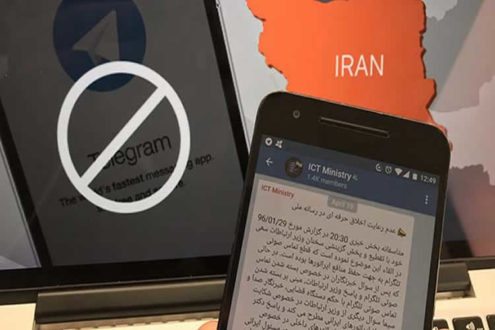VOA – Iran has extended a major shutdown of internet access into a seventh day to suppress domestic opposition to the government, prompting the United States to sanction the Iranian official overseeing the outage.



The #Iran internet shutdown is now in its 144th hour, keeping friends and family out of touch and limiting the basic rights of Iranians
Subscribe to our network monitor channel to track national connectivity in real-time #IranProtests #Internet4Iran
https://www.youtube.com/watch?v=TxdPm0vB-FA …

6364:43 PM – Nov 22, 2019Twitter Ads info and privacy431 people are talking about this
In a tweet late Friday, London-based internet monitoring group NetBlocks said the shutdown had lasted a full six days and was “keeping friends and family out of touch and limiting the basic rights of Iranians.” A livestream of Iran’s internet connectivity rate on the group’s YouTube channel showed a slight improvement to 20%, after having risen to 15% from 5% on Thursday.
Some Iranian officials have said they expect internet access to be gradually restored in the coming days. But there was no government announcement of a date for an end to the shutdown, which began in the evening of November 16 as authorities tried to stop Iranians from sharing images of nationwide anti-government protests that had erupted the previous day.
A news agency of Iran’s Islamic Azad University, a private national university network, said in a Thursday article that seven other major universities in the country had their internet access restored. But it cited a public relations director for one of them, Sharif University, as saying the renewed access was “very slow.”
Iranian officials sparked the protests when they raised the subsidized price of gasoline by 50% on Nov. 15. The hike further strains the finances of many Iranians facing hardship in an economy already weakened by U.S. sanctions and government corruption and mismanagement.
In its first punitive response to the internet shutdown, the Trump administration sanctioned Iranian Information and Communications Technology Minister Mohammad Javad Azari Jahromi on Friday.

The Treasury Department said Azari Jahromi’s ministry has been responsible for restricting the Iranian people’s access to the internet, including popular messaging apps used by tens of millions of Iranians to communicate with each other and the outside world. It added Azari Jahromi to its Specially Designated Nationals and Blocked Persons list, freezing his assets under U.S. jurisdiction and prohibiting Americans from any dealings involving those assets.
British rights group Amnesty International has said it documented the killings of 106 protesters in the crackdown by security forces during the period Nov. 15-19.
Tehran has rejected Amnesty’s death toll as speculative but has declined to issue its own tally of protester fatalities. Authorities said several security personnel also were killed in violence by “thugs” who attacked stores and burned buildings in cities around the country.
Iranian leaders have said they succeeded in crushing the unrest after several days, while blaming the protests on incitement by foreign “enemies” and exiled opposition groups. The internet shutdown made it difficult to verify whether the demonstrations have ended.

“The United States stands with the people of Iran in their struggle against an oppressive regime that silences them while arresting and murdering protesters,” said Secretary of State Mike Pompeo in a Friday statement. “No country or company should enable the regime’s censorship or human rights abuses. The United States will expose these human rights abusers and record their shameful acts for history.”
A day earlier, Pompeo took the unusual step of tweeting an appeal, in Farsi and English, for Iranians to send “videos, photos and information documenting the regime’s crackdown on protesters.” He said people could do so via the @RFJ_Farsi_Bot Telegram channel. It was not clear when the State Department would reveal any content that it has received.
Azari Jahromi, who has 168,000 followers on his verified Twitter account, tweeted late Friday for the first time since the protests began, issuing a defiant response to being sanctioned by Washington.

MJ Azari Jahromi✔@azarijahromi
I’m not the only member of club of sanctioned persons (Based on Trump’s fairytales). Before me, Iran ICT startups, Developers, Cancer patients and EB children were there.
I’ll continue advocating access to Internet & I won’t let US to prohibit Iran development.#EconomicTerrorism9158:20 PM – Nov 22, 2019Twitter Ads info and privacy3,337 people are talking about this
“I’m not the only member of [the] club of sanctioned persons (Based on Trump’s fairytales). Before me, [there were] Iran ICT startups, Developers, Cancer patients and EB [skin disease] children,” Jahromi wrote.
Iran has said U.S. sanctions targeting its oil, banks and other major industries represent a campaign of “economic terrorism” against the Iranian people. Washington has said humanitarian trade with Iran is exempt from its sanctions, whose aim is to deny resources to the Iranian government for malign activity.
“I’ll continue advocating access to Internet & I won’t let US to prohibit Iran development,” Azari Jahromi added.
A U.S. Treasury statement identified the 38-year-old as a former Iranian intelligence officer involved in surveillance operations that enabled the government to arrest protesters involved in peaceful opposition demonstrations in 2009. The Treasury said Azari Jahromi has been accused of personally interrogating multiple activists during that period.
In a VOA Persian interview, analyst Behnam Ben Taleblu of the Washington-based Foundation for Defense of Democracies said Azari Jahromi has been a key figure in Iran’s censorship apparatus.
“Targeting him is both symbolic and effective, but should not be the end of the stick. It should be a first step toward the U.S. going after Iran’s entire telecommunications infrastructure, and that could include its satellites,” Taleblu said.
This article originated in VOA’s Persian service. Katherine Ahn contributed to this report.
 Shabtabnews In this dark night, I have lost my way – Arise from a corner, oh you the star of guidance.
Shabtabnews In this dark night, I have lost my way – Arise from a corner, oh you the star of guidance.


